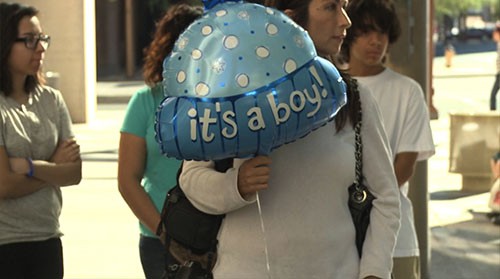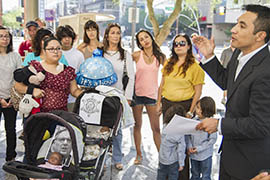Cronkite News has moved to a new home at cronkitenews.azpbs.org. Use this site to search archives from 2011 to May 2015. You can search the new site for current stories.
Order of monitor for sheriff’s department draws criticism
PHOENIX – After a federal judge ordered that a monitor guard against racial profiling by the Maricopa County Sheriff’s Office, Denise Velez showed up with a handful of demonstrators Thursday to fill out a tongue-in-cheek application to “babysit” Sheriff Joe Arpaio.
“I have a lot of experience with bullies,” said Velez, who came from Tucson with her two daughters to protest the sheriff’s treatment of Latinos.
Organized by longtime Arpaio critic Randy Parraz, president of the group Citizens for a Better Arizona, the demonstration called attention to the latest development from a judge who found earlier this year that Arpaio’s department had engaged in racial profiling. The sheriff’s department is appealing the ruling.
On Wednesday, U.S. District Court Judge Murray Snow ordered the Maricopa County Sheriff’s Office to take a number of steps, including increasing data collection and reporting, placing cameras in every deputy’s car, creating a community advisory board and appointing a monitor to ensure compliance.
Those measures didn’t satisfy Citizens for a Better Arizona.
“We’ve already got to pay for a sheriff who is incompetent and can’t do his job,” Parraz said. “Now we’ve got a judge who’s acting as a father and who has appointed a babysitter to come in and do the sheriff’s work. What’s that going to cost us?”
Kelly Flood, senior staff attorney with the American Civil Liberties Union of Arizona, which helped bring the class-action lawsuit, said the order was appropriate and necessary to address years of abuse.
“We think it’s a start,” she said. “It’s going to take time to implement, time for the sheriff’s office to come into compliance and time to mend the relationship with the community.”
The monitor’s role will be limited, according to Tim Casey, Arpaio’s attorney.
“The monitor has absolutely no veto power whatsoever over the sheriff,” Casey said. “He simply serves in a capacity where he recommends and advises the sheriff on how he might be able to implement best practices in the office.”
He added: “We’re hoping that the monitor appointed by the court will be someone of significant law enforcement experience and integrity.”
The community advisory board is to have six members – three appointed by the sheriff’s office and three by the the ACLU of Arizona.
“The relationship between the sheriff’s office and the Latino community has been broken for years,” Flood said.
“We think having this board come together and represent both sides of the table is the best way to try to repair the relationship.”
Casey said he hopes the board will allow the sheriff’s department to communicate with and get feedback from the Latino community.
“If it turns out to be a political circus, then it won’t have any value whatsoever,” he said.










